九年级英语Unit3导学案
- 格式:doc
- 大小:2.41 MB
- 文档页数:18

九年级英语Module 11 Photos Unit 3导学案学习目标掌握which , who引导的定语从句。
He’s the boy who won the photo competition last year !The photo which we liked was taken by Zhao Min.自主预习单项选择1. I hate people A talk much but to little.A. whoB. whichC. whoseD. whom2. Zhang Lili is considered as the most beautiful teacher B gave her love to her students in danger.A. whoB. thatC. whomD. which课堂导学1. Do you mind if I try it out?你介意我试用一下吗?句型1:do you mind….?你介意……吗Do you mind….?,意为“你介意……吗”,表示请求允许或征求对方意见,后接动名词或if 引导的从句。
mind作动词,意为“介意,反对”,通常用于疑问句、否定句或条件句中,后接名词、动名词或从句。
I don’t mind a joke , but this is going too far .我并不介意开玩笑,但这个玩笑太过分了。
Do you mind if I open the window?你介意我打开窗户吗?即学即练单项选择- Nick , would you mind C out of the bathroom?- Sorry , I won’t be long.A. comeB. to comeC. coming解析:Would you mind….?,意为“你介意……吗”?mind后接动词时应用动词的-ing形式,故选C。
2. Photography become a kind of art by the end of the nineteenth century.在19世纪末,摄影已经成了一种艺术。
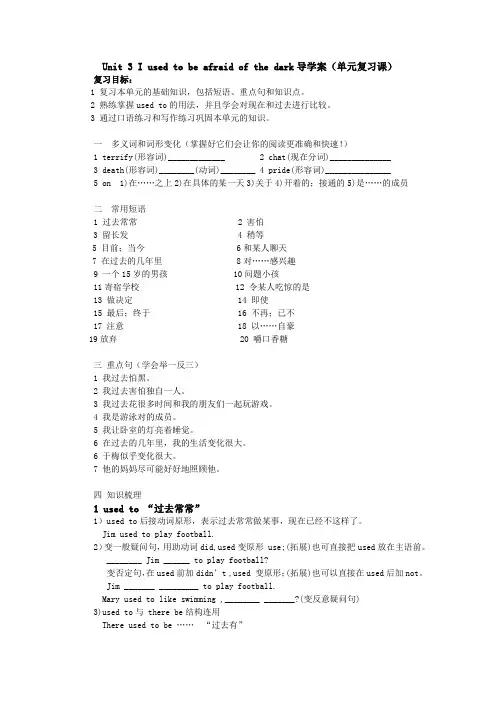
Unit 3 I used to be afraid of the dark导学案(单元复习课)复习目标:1 复习本单元的基础知识,包括短语、重点句和知识点。
2 熟练掌握used to的用法,并且学会对现在和过去进行比较。
3 通过口语练习和写作练习巩固本单元的知识。
一多义词和词形变化(掌握好它们会让你的阅读更准确和快速!)1 terrify(形容词)_____________2 chat(现在分词)______________3 death(形容词)________(动词)________4 pride(形容词)_______________5 on 1)在……之上2)在具体的某一天3)关于4)开着的;接通的5)是……的成员二常用短语1 过去常常2 害怕3 留长发4 稍等5 目前;当今 6和某人聊天7 在过去的几年里 8对……感兴趣9 一个15岁的男孩 10问题小孩11寄宿学校 12 令某人吃惊的是13 做决定 14 即使15 最后;终于 16 不再;已不17 注意 18 以……自豪19放弃 20 嚼口香糖三重点句(学会举一反三)1 我过去怕黑。
2 我过去害怕独自一人。
3 我过去花很多时间和我的朋友们一起玩游戏。
4 我是游泳对的成员。
5 我让卧室的灯亮着睡觉。
6 在过去的几年里,我的生活变化很大。
6 于梅似乎变化很大。
7 他的妈妈尽可能好好地照顾他。
四知识梳理1 used to “过去常常”1)used to后接动词原形,表示过去常常做某事,现在已经不这样了。
Jim used to play football.2)变一般疑问句,用助动词did,used变原形 use;(拓展)也可直接把used放在主语前。
________ Jim ______ to play football?变否定句,在used前加didn’t ,used 变原形;(拓展)也可以直接在used后加not。
Jim _______ _________ to play football.Mary used to like swimming ,________ _______?(变反意疑问句)3)used to与 there be结构连用There used to be ……“过去有”在中国,过去有很多大熊猫。
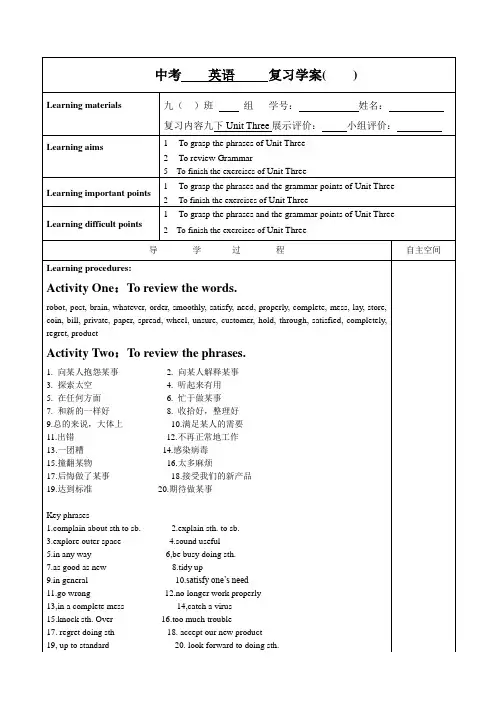
九年级(下)Unit 3一、单项填空1. ________ scientists have done a lot of research on A(H1N1)flu,there are still some cases for further study.A. AsB. OnceC. IfD. Although2.When I was young,I _______ in the country.A. used to liveB. was used to liveC. used to livingD. was used to living3. Kunming is a beautiful city _______ the southwest of China.A. onB. inC. toD. at4. Guilin is famous _______ its natural landscapes.A. forB. asC. withD. in5. I hope _______ to my birthday party next Sunday.A. your comeB. you to comeC. you can comeD. you came6. _______ it rained heavily, the workers went on working.A. BecauseB. IfC. UnlessD. Although7. She _______ down because she had a headache.A. layB. liedC. liesD. lie8. Tony gets up _______ early _______he can be the first one to get to his classroom.A. so; thatB. such; thatC. too; toD. enough; to9. There are _______ things in your room. Stop buying anything until you can clean up your room.A. too manyB. lessC. too muchD. so much10. The room _______ flowers.A. fill withB. full ofC. is filled withD. is filled of11. My brother goes to learn how to play the piano every day _______ Saturday and Sunday. He plays footballon these days.A. besidesB. duringC. exceptD. from12. Read it aloud _______ the class can hear you.A. so thatB. ifC. whenD. although13. —I really hope to keep in touch with Lily.—Sorry. I don’t know ________.A. what her name isB. what her job isC. what her number isD. when she left14. —Would you like to go bike riding with us tomorrow?—Sure,________ I am busy.A. sinceB. unlessC. whenD. until15. He _______ every Saturday morning _______ in an animal hospital.A. spends; workingB. spends; to workC. pays; workingD. pays; to work二.阅读理解(每小题2分,共20分)AMr and Mrs Smith had always spent their summer holidays in New Jersey(新泽西)in the past,staying in a small inn (旅店) at t he foot of a hill.One year,however,Mr Smith made a lot of money in his business,so they decided to go to London and stay at a really good hotel while they went touring around that famous city.They flew to London and arrived at their hotel late one evening. They had expected that they would have to go to bed hungry,because in that small inn in New Jersey,no meals were served after seven. They were surprised when the waiter asked whether they would take dinner there that night. “Are you still serving dinner?” asked Mr Smith. “Yes,certainly,sir,” answered the waiter. “We serve it until half past nine.”“What are the times of meals then?”asked Mr Smith.“Well,sir,”answered the waiter.“We serve breakfast from seven to half past eleven in the morning,lunch from twelve to three in the afternoon,tea from four to five,and dinner from six to half past nine.”“But that hardly leaves any time for us to see the sights of London,”s aid Mr Smith.1. Mr and Mrs Smith had always spent their holidays in _______.A. New YorkB. LondonC. New JerseyD. Washington2. When Mr and Mrs Smith had a lot of money,they decided to go to _______.A. their hometownB. the capital of EnglandC. New JerseyD. a small city in England3.. They went to London by _______ .A. seaB. planeC. trainD. bus4. From the story we know that this was the _______ time for Mr and Mrs Smith to go to London.A. firstB. secondC. thirdD. fourth5. What does the sentence “But that hardly leaves any time for us to see the sights of London” mean?A. We can go to see the sights of London at any time.B. We have enough time to see the sights of London.C. We can see more sights of London.D. We have little time to see the sights of London.三.词汇(A)根据句意及首字母提示完成单词。

Unit 3 Teenagers should be allowed to choose their own clothes第一课时Section A 1a-2c【三维目标】1知识目标:四会单词短语及句型。
2能力目标:能在具体语境中正确运用被动语态。
3情感目标:增强交际能力,培养关心他人,礼貌待人的品质。
【学习重难点】:重点词汇用法及正确运用被动语态【学习过程】(一)预习导学:熟读单词并找出SectionA1a-2c中的重难点(二)朗读Section A 1a-2c,找出下列短语。
16岁的青少年____________________ 被允许__________________ 打耳洞___________和朋友一起外出_______________ 不够认真______________ 年龄不够大__________不够沉着__________________ 太狂热__________________ 太愚蠢______________(三)课堂活动.(教师寄语: 展示自我,合作提高)1.检查课前预习,小组合作交流讨论解决问题,并完成要点导学。
2. 听录音,完成1b,2a和2b。
3.读听力材料,理解以下几个句子:Go to the mall with John. Get her ears pierced. Is allowed to choose her own clothes(四)合作探究:Talk about what you are allowed to do导学1:teenagers should be allowed to choose their own clothes.(1).should be allowed为含有情态动词的被动语态,英语动词有两种语态,既主动语态和被动语态,主动语态表示主语是动作的执行者,被动语态表示主语是动作的承受者.被动语态的构成:主语+be+及物动词的过去分词be有人称和时态的变化.Eg: 我们学校每年都栽树. Trees in our school every year.这本书是昨天买的The book yesterday.含有情态动词的被动语态其结构为:情态动词+ be+及物动词的过去分词Eg: 作业应该按时上交。
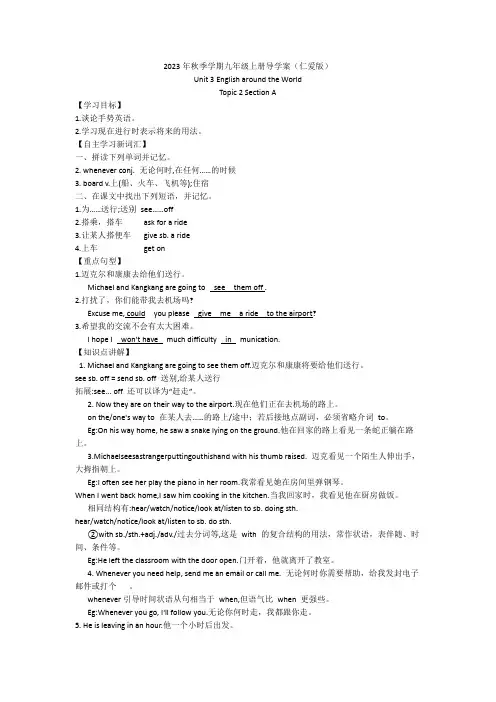
2023年秋季学期九年级上册导学案(仁爱版)Unit 3 English around the WorldTopic 2 Section A【学习目标】1.谈论手势英语。
2.学习现在进行时表示将来的用法。
【自主学习新词汇】一、拼读下列单词并记忆。
2. whenever conj. 无论何时,在任何……的时候3. board v.上(船、火车、飞机等);住宿二、在课文中找出下列短语,并记忆。
1.为……送行;送别see……off2.搭乘,搭车ask for a ride3.让某人搭便车give sb. a ride4.上车get on【重点句型】1.迈克尔和康康去给他们送行。
Michael and Kangkang are going to see them off .2.打扰了,你们能带我去机场吗?Excuse me, could you please give me a ride to the airport?3.希望我的交流不会有太大困难。
I hope I won't have much difficulty in munication.【知识点讲解】1. Michael and Kangkang are going to see them off.迈克尔和康康将要给他们送行。
see sb. off = send sb. off 送别,给某人送行拓展:see... off 还可以译为“赶走”。
2. Now they are on their way to the airport.现在他们正在去机场的路上。
on the/one's way to 在某人去……的路上/途中;若后接地点副词,必须省略介词to。
Eg:On his way home, he saw a snake lying on the ground.他在回家的路上看见一条蛇正躺在路上。
3.Michaelseesastrangerputtingouthishand with his thumb raised. 迈克看见一个陌生人伸出手,大拇指朝上。

Unit3 Reading导学案【学习目标】教师“个备”或学生笔记栏1.To understand how to write about problems and to express feelings2.To recognize and understand vocabulary about problems.3.To know the uses of “get”【重点、难点】1 学会分析文中宾语从句的结构。
2 写作中能使用文中的句子。
【课前预习】选用所给词语的适当形式填空Whether imagine on time hand in feel bad about1.I can’t ___________my life without hobbies.2.It is very important for students ____________their homeworkevery day.3.I am interested in _____________________ he will go abroador not.4.I have no time to play basketball every day because oftoo much homework. So I _______________ that.5.We must get to the station __________________, or we willmiss the train.【学习过程】Step1: Pre-readingStep2: While readingStep3: Listen the audio again and find the answers to the questions:Step4:Explaination1.be worth +n. The pen is worth 5 dollars.2.be worth doing the song is worth listening to.3.offer to do he offered to help me.4.offer sb. Sth. Offer me a jobStep5:Reading Read the text carefully.Step6:ExerciseStep7:Homework1. Revise this period2 .Remember the reading text【当堂训练】动词填空1.I hope this kind of problem must ________________(deal) with as early as possible.2.These days we _________________(revise) for the exams.3.The poor boy had to work all day ______________(support) his family.4.What about ______________(choose) one hobby or two?5.Do you think the book on Chinese History is worth __________(read)?6._______________(discuss) this problem is going to take a long time.Let’s keep our voice down so we___________________( not disturb) others.7.I __________(doubt) if he would come soon.8.Lisa is my good friends,she often offers us good ________(advise)?9.Have you ___________(choice) what you want for your birthday?10.One way ____________(solve ) your health problems is __________(take) more exercise and eat less sw eet food.11. He had no choice but _________(wait) in the shop.12.The boy did nothing but ____________(watch) TV all day.13.Amy ______________(teach) in this school since she _______ (leave) college.【课后提升】一,根据句义及中文提示写单词二.选择( )1.I agree _____ your plan, but I don’t agree _____ you.A.with,toB.on ,withC.to,withD.to,on( )2.Our teacher is very strict _____ us and he is strict ____ his teaching.A.in,inB.with,withC.with,inD.in ,with( )3.Liu Mei spends a lot of time _____ the rules to her friends.A.to explainB.explainingC.to askD.asking( )4.Simon hopes that his advice is worth ____ and helpful.A.takingB.to takeC.givingD.to give( )5.—There is still ____ time.You don’t need to hurry, Jack.A.a lotB.plenty ofC.littleD.lot of( )6.I wish I __________ full marks in all the exams.A.will getB.getC.can getD.c ould get( ) 7.Excuse me , could you tell me _____________?A . where does he live B. where he livesC. he lives whereD. if he lives where( )8.You hardly have supper in the restaurant, _______?A. don’t weB. don’t youC. do weD. do you( )9.Ken advised us ______ hills, but Lily preferred _______swimming.A. to climb, to goB. climbing, goingC. to climb, goingD. climbing, to go( ) 10. Please stay here. It’s raining _____ outside.A. hardB. hardlyC.heavyD. big( ) 11. Would you please tell me _____ to deal with all the problems?A. howB. whyC. whatD. which三.翻译句子1.我有时怀疑这部电影是否值得看。
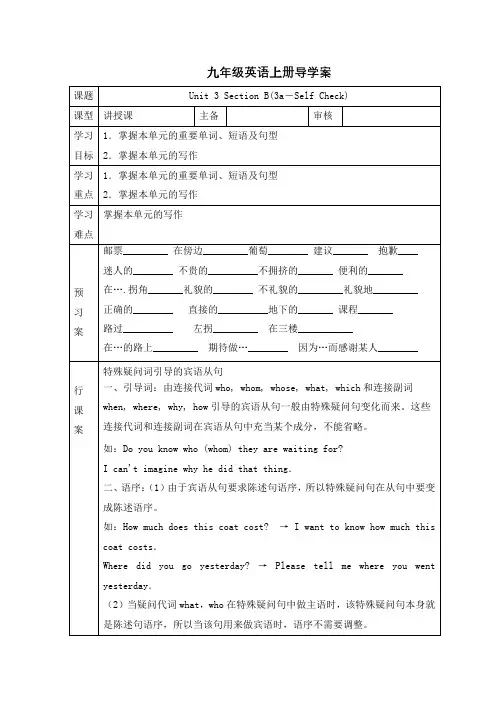
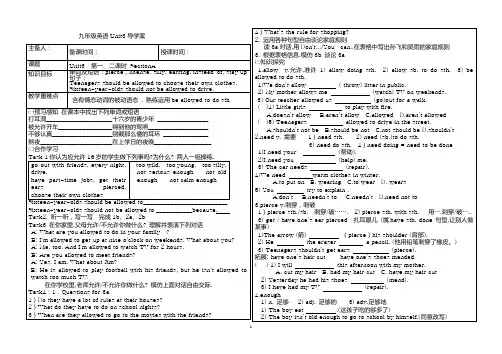

冀教版九年级英语Module 6 Problems Unit 3导学案学习目标理解并正确运用if引导的条件状语从句。
(重点)If you do all these other things instead of your homework , you won’t have time to study.自主预习按要求完成句子1.Hurry up , or we’ll be late .(变为含有if的条件状语从句)If we don’t hurry up ,we’ll be late .2. It will be sunny tomorrow , Jim will go for a picnic.(用if连接成一个句子)。
If its sunny tomorrow , Jim will go for a picnic.课堂导学1. She refused to let me wear them , because she bought them for her sixteenth birthday party.她不让我穿那双鞋因为那是她买来打算在岁生日聚会上穿的。
单词1:refuse拒绝refuse作动词,意为“拒绝”,后可接名词或代词,表示拒绝要求、申请、请愿等。
其后也可接不定式作宾语,refuse to do sth.意为“拒绝做某事”。
She refused their invitation.她拒绝了他们的邀请David refuses to let me use his computer .戴维拒绝让我使用他的电脑即学即练一单项选择- Why do you refuse D shopping with them?- Because I have too much work to do today .A. goB. goingC. goesD. to go解析:refuse to do sth. 表示“拒绝做某事”。
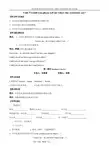
Unit 3 Could you please tell me where the restrooms are? 【单元学习目标】1.学会有礼貌的问路以达到购物或办事的目的。
2.学会为他人指示方向或路线。
3.学会在活动或者购物场所中表达自己的爱好和想法。
【单元重点难点】重点:1.学会礼貌询问语言Could you please tell me where…?Excuse me,do you know where I can …?2.学习宾语从句注意事项。
难点:掌握几种礼貌问路的方式Excuse me,do you know where I can buy some shampoo?Could you tell me how to get to the post office?Could you tell me where I can get a dictioary?Could you tell me where the Center Street is?第一课时Section A (1a-1c)主备人:马俊珍审核人:宋剑【学习目标】1.掌握词汇restroo m、stamp 、bookstore 、beside.2.宾语从句注意事项。
3.完成主要句型的学习和听力练习。
【重点难点】重点:学会有礼貌的问路以达到购物或办事的目的。
难点:问路和指路的几种表达方法。
【导学过程】一、课前预习取钱_______________ 得到几本杂志在右边得到城市的一些信息___________ 买些邮票______________ 买字典______________ 向左拐__________________ 向右拐_____________ 买一双鞋子二、自主学习、合作探究(一)自主学习1. 预习检查。
2. 朗读1短语,完成搭配练习。
3. 学习礼貌询问语言及回答Could you please tell me where…?Excuse me,do you know where I can …?Yes / sure. There ‗s a …4. 1b听力训练。

Unit 3 Could you please tell me where the restrooms are?Section A1 (1a-2d)【学习目标】1. 学习和掌握词汇:restroom,stamp,bookstore,postcard,pardon,bathroom,rush2. 会译会用短语:get some money get a pair of shoes buy some stampsget some information about the town go alonggo past turn left/right on the left/right3. 熟练运用句型:1.—Could you please tell me where the restroom is?—Sure, There is a restroom on Main Street2.—Do you know Where I can buy some stamps?—Yes, There is a post office on Center Street.3.—Can you tell me how I can get to the post office?—Yes, Go past the bank and turn right. The post office is on the right.4. 通过本节课的学习,懂得在向别人寻求帮助时,要有礼貌地发出请求,并对别人的请求给予帮助,明白帮助别人实际是在帮助自己。
【学习重点和难点】1. 掌握本课时词汇和句型,通过交流表达和听力训练,引入各种地点和方法来学习“Could you please tell me…?”。
2. 有礼貌地向他人寻求帮助并作出应答。
3. 正确使用含有wh-问句的宾语从句,有礼貌地向他人寻求帮助。
【课前预习】一、请根据中文意思写出下列重点单词。
九年级英语Public holidays Unit3导学案学习目标一、掌握时间状语从句的用法。
(重点)二、能用英语介绍你自己喜欢的假期并说明喜欢的理由。
自主预习从方框中选出正确的连词或词组填空1.They didn’t go to bed until they finished the work2.What should I do when the earthquake happens ,dad?3.A true friend can see the pain in your eyes while everyone else believes the smile on your face.4.Maria hasn’t seen her son since she came to China.5.- Will you please tell her about the news?- Sure ,I’ll tell her about it as soon as she comes back.课堂导学1.They do not know that it is their parents who put the presents at the end of their beds while they are sleeping.他们不知道是他们的父母在他们睡觉的时候把礼物放在他们床头上的。
句型1:强调句强调句即“It is/was + 被强调部分+ that /who +句子其他部分”结构,可用来强调句子的主语、宾语或状语,it没有实际意义,只是引出被强调的成分。
如果被强调的成分是表示人的词并且在句中作主语,用who或that都可以;如果被强调的是其他成分,则用that。
It was in front of the bank that my granny was robbed.我奶奶正是在银行前面被抢劫的。
最新人教版九年级英语上册导学案(全册) Unit 1: Hello!- 研究目标:了解如何问候和介绍自己- 核心词汇:- 问候:hello, hi- 介绍自己:I'm..., My name is...- 重点句型:- 问候语句:Hello! Hi!- 自我介绍句:I'm Linda. My name is Tom.Unit 2: How do you spend your day?- 研究目标:描述日常活动- 核心词汇:- 日常活动:get up, have breakfast, go to school, study, play sports, have dinner, go to bed- 重点句型:- 描述日常活动:I get up at 7 o'clock. I have breakfast at 8 o'clock.Unit 3: How much is it?- 研究目标:研究购物和问价格- 核心词汇:- 购物:buy, shop, store- 价格:how much, expensive, cheap- 重点句型:- 问价格:How much is the T-shirt? It's 50 yuan. Unit 4: What's the weather like today?- 研究目标:谈论天气状况- 核心词汇:- 天气:weather- 天气状况:sunny, cloudy, rainy, snowy- 重点句型:- 谈论天气:What's the weather like today? It's sunny. ...(继续编写其他单元的导学案)总结:本册导学案主要包括九年级英语上册各个单元的核心词汇、学习目标和重点句型,旨在帮助学生更好地掌握课程内容。
通过学习这些导学案,学生可以增强他们的英语听说读写能力,提高英语表达的准确性,为下学期的学习打下坚实的基础。
UNIT 3 Could You Please Tell Me Where the Restrooms Are?一、重点短语①路过;经过____pass by________①pardon me______对不起;请原谅_______①走过书店_____walk by a bookstore_______①mail a letter______邮寄一封信_______①沿着...走______go walk along_______①on one’ s way to... _____在去...的路上_______①建议做某事____suggest doing_______① lead into a request_____提出一个请求________①做某事很方便______be convenient to do_______①look forward to… ______期盼;盼望_______二、知识点讲解1. both, all, either, neither, none 的区别(1) both ---“都”(两者)(2) all ---“都”(三者及以上)(3) either---①两者中的任何一个;②也(否定)(4) neither---“都不”(两者)(5) none---“都不”(三者及以上)Eg.①___Both____ Lucy and Kate are going to see a film tonight.②I have only one ticket, so ____either___ Lucy or Kate ___is____ (is / are) going to see a film tonight.③___All____ the students in China are going to enjoy their 7-day holiday.④--- Would you like some tea or coffee?---___Neither____. I’d like some water.⑤___None____ of us like summer, because it’s too hot.2. between 和among的区别(1) between .... and... 在...和....之间(两者)(2) among用于三者或三者以上的比较3. spend, take, cost与pay辨析(1) spend,其主语通常是人,结构为:spend time/ money doing sth. “花费时间/金钱做某事” 或spend money on sth.“在某事/某物上花费金钱”(2) take,常用it作形式主语,It takes sb. some time to do sth.“做某事花费某人多长时间”。
九年级英语导学案主备人审核人学习时间课时 1 课题Unit 3 Could you please tell me where the restrooms are? Period 1 Section A(1a-2c)学习目标1. 掌握重要词汇。
2. 学会问路以及指路的表达方法。
学习重点1.单词:restroom, stamp, beside, postcard2.短语:get to, on your right/left, turn left, between ... and... , go past, a pair of3.句子:Excuse me, could you tell me where I can get some money?Excuse me, could you please tell me how to get to the bookstore?Do you know when the bookstore closes today?Go to the second floor. There is a bookstore between the bank and the supermarket.教学准备学习过程学习笔记一、自主预习预习书本P17-18(1a-2c)页的相关内容,完成下列翻译下列短语。
1、请同学们先认真阅读学习目标,然后仔细研读课本,看完后将所学到的东西进行归纳,画出重要知识点,用红笔做好疑难标记。
2、大声朗读P17 1a中的8个短语3、英汉互译短语。
get to just go along pass Center Streeton your right go to the third floor turn left/rightbetween…and…go pass the bookstore get some postcards4. 写出你知道的表示位置关系的介词或短语二、合作探究I、看1a中的图,并运用1a中的8个短语仿编对话。
英语学科九年级(上)导学案Unit3 Teenagers should be allowed to choose their own clothes. Period 1. Grammar[课型][课时]丸丄[编制人]李世龙[班级] _________________________ [姓名]______________ 【学习目标】1.常握P18、19页的单词和短语2.常握重要句型结构及情态动词的被动语态的用法。
【重、难点】(1)1 think students should be allowed to do homework with friends. (2)Sixteen -year-olds should not be allowed to drive . (3) Habit-forming: Practice the conversation.【学法指导】1.自学P18~19页单词和la,熟Grammar focus,组长负责听写。
2.通读Grammar focus内容,并用双色笔勾出重点短语、句型和疑难点,准备课堂中讨论解决。
【预习自测】一、翻译短语(背诵)穿耳洞_______________________ 允许某人做某事 _________________________ / ____________________选择自己的衣服__________________________ 被允许外出____________________ 被允许做某事______________二、根据首字母写出单词1 .Teenagers shouldn't be allowed to get their ears p _______________ .2.You can't drive the cai*. Because you don't have a driver's 1 _______________ .3.Her som is old c __________ to go to school.[我的疑惑]写出预习中你不能解决的问题 __________________________________________________________【合作探究】探究点一:被动语态:主动语态的主语是动作的发出者,被动语态的主语是动作的承受者。
Unit 3 Topic 1 Section A一、预习导纲。
1、单词记忆与记忆。
1)cartoon____________ 2)character____________ 3)language_____________ 4) garage_____________2、短语互译与记忆。
1) from now on____________________ 2) be pleased with_________________ 3) one day___________________ 4) throughout the world_________________ 5) can’ t wait to do sth._________________ 6) 为…做准备___________________7) 成千上万;许多____________________ 8)有机会做某事__________________二、课堂导练:单项选择( ) 1. English _____by many people.A. speaksB. are spokenC. is speakingD. is spoken( ) 2. This kind of car _____ in Japan.A, makes B. made C. is making D. is made( ) 3. Doctors _____ in every part of the world.A. needB. are needingC. are neededD. will need( ) 4. The air _____ by many factories nowadays.A. pollutedB. was pollutedC. is pollute D is polluted( ) 5.---John, your birthday is coming. Let’s book a cake.---Oh, great! I can’t wait _____ it now.A. enjoyB. enjoyingC. to enjoyD. for enjoying( ) 6. If you have a chance _____ in a university,you shouldn’t give it up.A. studyB. studyingC. to studyD. studied( ) 7. My dancing teacher _____ my performance on the stage .I am so happy.A. is please withB. pleased withC. is pleased withD. be pleased with( ) 8. Mum, I_____ the trip , Can we start now ?A. ready forB. are ready forC. am ready toD. am ready for ( ) 9. The place of interest is visited by _____ people throughout the world.A. millions ofB. three million ofC. three millions ofD. million of ( ) 10 . The People's Republic of China _____on October 1, 1949.A. foundB. was foundedC. is foundedD. was foundUnit 3 Topic 1 Section B一、预习导纲。
1、单词记忆与记忆。
1)pack_____________ 2) Spanish____________ 3) interpreter____________ 4) exactly____________ 5)system____________ 6) company_____________ 7) besides____________ 8) whenever___________ 9)French______________ 10) deliver__________ 11) postman___________2、短语互译与记忆。
1)on business ________________________ 2)be similar to ______________ 3) translate into________________________ 4)in general ________________ 5)once in a while_______________________ 6) divide--- into______________ 7) 做某事有(没有)困难_________________ 8) 向某人解释______________ 9)第二语言____________________________ 10)和某人交谈______________ 二、课堂导练:单项选择( ) 1. New computers_____ all over the world.A. is usedB. are usingC. are usedD. have used( ) 2. Mary’s bike _____ Jane’s.A. is the same toB. is similar asC. is similar toD. are similar to ( )3.__, I have to write the words on the paper because she doesn’t know Chinese.A. SometimeB. Once in a whileC. After a whileD. For a while ( ) 4. Maria has ___ trouble ___ math, so she often asks her math teacher for help.A. much; understandingB. no; withC. many; understandingD. not; to understand( ) 5._____ you need help, give me call.A. WheneverB. WhateverC. HoweverD. Wherever ( ) 6._____ you do, I will be on your side.A. WheneverB. WhateverC. HoweverD. Wherever( ) 7._____ English, we study many other subjects.A. besideB. besidesC. exceptD. but( ) 8. We’re all here _____ Ann. She is ill in bed.A. besideB. besidesC. exceptD. including( ) 9. Our teacher often ask us _____some Chinese_____ English.A. translate , intoB. translate, toC. to translate ,intoD. translate, in ( )10.---Hi, Jane, tell you a piece of good news. I _____ America tomorrow.---Wow, have a good trip!A. will leave toB. leaves forC. am leaving forD. going leaving forUnit 3 Topic 1 Section C一、预习导纲。
1、单词记忆与记忆。
1) state______________ 2) speaker____________ 3) communicate____________ 4) tourism____________ 5) conference___________ 6)tourist _______________ 2、短语互译与记忆。
1) more than____________ 2) the number of +可数名词复数_________________3)a number of +可数名词复数_______________________________4) play a/an---part ___________________ 5)母语___________________________ 6)三分之二_____________________ 7)虽然,尽管___________________________8) 和某人交流______________________二、课堂导练:1、单项选择( ) 1. There are __ students in our school, and__ the student in our school is 5000.A. a number of ; the number ofB. the number of ;a number ofC. much, the number ofD. many, a number of( ) 2. Television _____ in our daily lives.A. play an important partB. play a important partC. plays an important roleD. played an important role( ) 3._____ of the students in our class _____ girls.A. Three fives; isB. Three fifths; isC. Three fifth; areD. Three fifths; are( ) 4. Japanese _____in every country.A. is not spokenB. are spokenC. is speakingD. is not speaking ( ) 5. I spend much money on books _____ I am not rich.A. butB. soC. even thoughD. as if( ) 6. I think it’s very important _____ foreigners at the moment.A. communicateB. communicate withC. to communicate withD. to communicate to( ) 7. These papers _____ yet.A. have not writtenB. have not been writtenC. has not writtenD. has not been written( ) 8. The little girl_____ to hospital at once.A. must sendB. must sentC. must be sendD. must be sent( ) 9.---Our school is beautiful!---It will be more beautiful if more trees and grass _____ by us.A. plantB. plantsC. is plantedD. are planted( ) 10. His new book _____next month.A. will be publishedB. is publishingC. is being publishedD. has been published2. 完形填空More than 3,000 languages are spoken on the earth today. Many of these languages are spoken 1 small groups of people. On the 2 hand, over 200 languages are spoken by one million or more people. Chinese is the language spoken by the 3 number of people in the world. But English is most 4 spoken in the world.English is spoken by more than 400 million people 5 their first language. It is 6 by most people in the U.S.A., Great Britain, Canada, Australia and New Zealand. And it is 7 used very widely in many other countries of the world.Look at the back of your watch. You may see the English words ―Made 8 China, or Japan, even Germany.‖ English is the first language in 9 of these countries. Why are English words 10 on it? That is because in the modern world English is widely used for business between different countries.( ) 1.A.as B. by C. for D. with( ) 2.A.other B. others C. another D. the second( ) 3.A.biggest B. bigger C. largest D. larger( ) 4.A.wide B. wider C. widest D. widely( ) 5.A.of B. in C. by D. as( ) 6.A.spoke B. spoken C. speak D. speaking( ) 7.A.either B. as well C. also D. too( ) 8.A.at B. of C. with D. in( ) 9.A.no one B. none C. nothing D. no( ) 10.A.written B. wrote C. write D. writingUnit 3 Topic 1 Section D一、预习导纲。